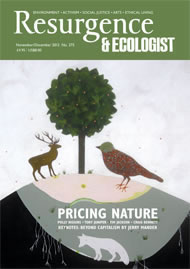When will we have had enough? It seems Barclays can blithely distort the basic interest rates to its advantage (probably with connivance from others); HSBC is being accused of laundering vast sums when it thought no one was looking, RBS cannot be trusted to run its own IT system, and Lloyds TSB is now embroiled in two massive mis-selling scandals, to name a few.
Is this what we expect – and accept – from our banking system in the UK?
The collapse of trust in financial services is gathering pace, but what can we do? It is the lack of alternatives and effective levers of action that insulates the large banks from having to really worry about these sorts of negative headlines. Domestic customers rarely take practical action such as moving accounts – it’s just too much trouble – and shareholder activism, even through our pension funds, has to date carried little weight. And since political parties of all colours have it as a tenet of faith to be close to the City when in power, our votes don’t seem to make much impact either.
As one-time head of ethics at the Financial Services Authority (FSA), I have found myself being put on the spot recently in both radio and TV interviews. And the one thing I can say for certain is that the oft quoted new buzzword in banking is ‘culture’.
Any vestige of an ethical culture in and amongst banks has been severely pressurised by targets and the exponential demands of growing shareholder value. The public have perhaps only recently become aware of how dominant figures such as Bob Diamond (ex-CEO of Barclays) and Fred Goodwin (ex-CEO of RBS Group) were able to override their own boards and drive a culture of results without boundaries, mainly through fear and gross incentives.
Regulators, I have to say, were guilty of looking the other way. And when the inevitable inconsequential enquiries come round, all we find is what I have termed ‘Murdoch’s fork’ – by which I mean management was either complicit or incompetent. In the end the story is the same: directors award themselves handsome pay-offs and the rest of us pick up the bill (and the pieces).
But we can do something about culture – something that will require a substantive and joined-up effort. It is no use carrying on just carping on the sidelines. Instead, many, many of us need to take action and get involved. This is not about short-term fixes. Sadly, a new ethics code and a one-hour-long ‘sheep-dip’ ethics training for all will change nothing. Who is kidding whom?
No, there need to be changes to the entire environment inside and outside banks.
And I have three concrete suggestions:
Firstly, there can be a step change in the nature of regulation, away from considering symptoms to addressing causes. Process regulation creates a culture of dependency amongst firms and launders a sense of conscience. We can regulate outcomes, not process. And this can include an explicit focus on ethics.
Secondly, the nature of governance and ownership are open questions that need deeper debate. Who are the non-executive directors, what questions should they be asking and who are the real owners – surely not trading computers that hold shares for all of 0.3 seconds? A system of carefully constructed challenges needs to be put in place at all levels in organisations in order to influence decision-making and avoid self-serving assumptions and practices becoming even more deeply entrenched.
Thirdly, we need a trenchant debate and engagement about the role of banking in society. Splitting banks à la Vickers may just produce more worms that wriggle in just the same way. Perhaps we should be saying, in summary, “Just grow up.” Currently legislation, political protection and regulation insulate companies from making difficult choices – yet they need to choose.
This process or building of maturity cannot be left to the market – the market in and of itself is not capable of making decisions about ethics. We must not be shy about a discussion that focuses on ends and not just means – we should all be asking, what do we want our society to be like? And how are utility and investment players able to contribute to this? It’s a matter then of hand-holding, education and all-round ethical culture.
Companies and their boards need to ‘learn’ to make the choice to do the right thing themselves. If the message is so fudged that all businesses hear is that acting ethically is a good idea solely because it delivers bottom line or a PR advantage, then this is not ethics – it is profitability dressed up as something else.
That is not to say being more ethical and responsible won’t be beneficial in many financial ways. I am sure it will: in building customer trust and confidence, encouraging staff allegiance, providing a marketing edge and also, quite rightly, reducing regulatory compliance costs. But the confusion of ethics and utility usually only makes matters worse as it simply begets cynicism and seems like any other consultant-driven and ephemeral passing fashion.
Unconditionality must play a key role and we must all beware of any ‘business case’ for ethics, because the practice of ethics must be unconditional.
Companies so often appear to operate in a bubble. One way of breaking down this isolation is by finding frameworks that show a convergence of aims and values. Perhaps surprisingly, a new raft of pioneering British Standards is now extending a development matrix methodology beyond financial services into all sectors. One of this new series, BS8904, focuses on developing Sustainable Communities – bringing businesses’ roles right into the centre of the picture. Its originations came from grassroots projects in my own community of Grasmere in the heart of the Lake District.
In general we need to create space for ethics in business and in our wider society – space in the sense of deliberate ‘gaps’ in regulations, and space in the sense of making ethics part of the everyday set of considerations and not just an uncomfortable add-on.
There are useful frameworks out there – The 21st Century Charter and The Ethics Mark are both good examples. Both show that the very process of having to commit to an ethical position develops substantive ownership and connection with community and a willingness to learn and accept accountability. Maybe by adopting something similar, the banks can be said (and seen) to be operating in good faith; and faith in the banking sector can start to be rebuilt.







